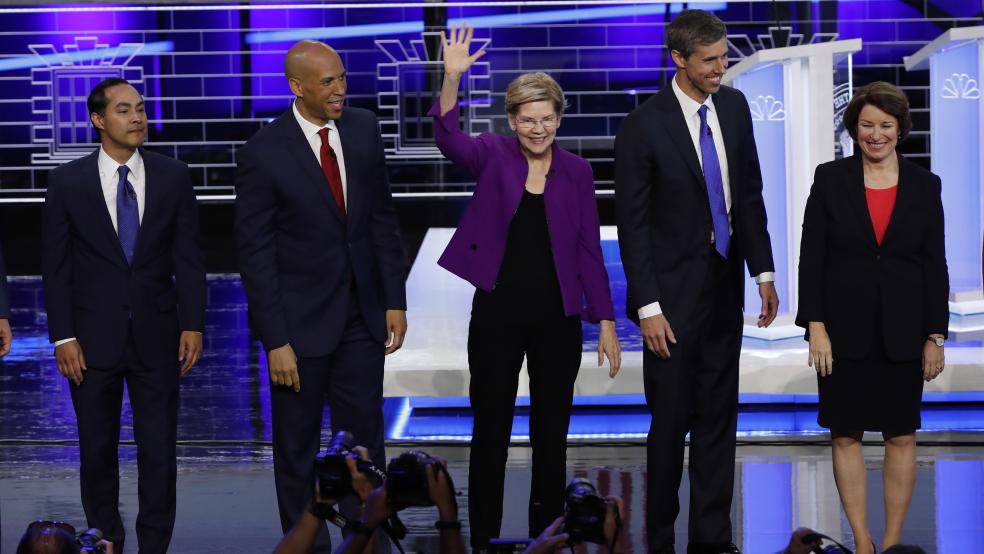Wednesday night’s initial Democratic primary debate provided Americans with a pretty clear sense of what kind of health-care reforms most of the candidates on stage prefer — and, in most cases, it isn’t the immediate establishment of a single-payer Medicare-for-All system. NBC moderator Lester Holt asked the candidates to raise their hands if they would abolish private health insurance in favor of a government-run system. Only Sen. Elizabeth Warren and New York Mayor Bill de Blasio signaled they would.
Warren, who is a co-sponsor of Sen. Bernie Sanders’ single-payer bill, had in the past left herself some wiggle room, suggesting that there are “a lot of different pathways” to make sure every person gets covered. This time, she was unequivocal in her support for a single-payer system. “Yes, I’m with Bernie on Medicare for All,” she said. Then she added:
“Look at the business model of an insurance company. It's to bring in as many dollars as they can in premiums and to pay out as few dollars as possible for your health care. That leaves families with rising premiums, rising copays, and fighting with insurance companies to try to get the health care that their doctors say that they and their children need. Medicare for all solves that problem.
“And I understand. There are a lot of politicians who say, oh, it's just not possible, we just can't do it, have a lot of political reasons for this. What they're really telling you is they just won't fight for it. Well, health care is a basic human right, and I will fight for basic human rights.”
Other candidates were more cautious.
- “I am just simply concerned about kicking half of America off of their health insurance in four years, which is exactly what this bill says,” Sen. Amy Klobuchar said, explaining why she prefers a public option.
- “100 million Americans say they like their private health insurance, by the way. … I think we should be the party that keeps what's working and fixes what's broken,” former Maryland Rep. John Delaney said. “Why do we have to stand for taking away something from people?”
Why Warren went all in: “It’s not hard to see why Warren has decided to join Sanders on this issue,” Slate’s Jordan Weissmann said. “The senator is running for the hearts and minds of the left by combining wonkishness and truly populist politics. But until now, Sanders has continued to outflank her on health care. And her squishiness on the topic—Democrats’ most potent policy issue—has been especially conspicuous, given that her entire campaign theme is about how she Has a Plan for That. Taking a firm, clear stance on it makes political sense as she battles for the progressive mantle.”
How it could backfire: The idea of replacing private insurance with a single government plan doesn’t poll as well as a public option, and a Kaiser Family Foundation tracking poll conducted in January found that support for Medicare for All dropped from 56% to 37% when the idea of eliminating private insurance is raised.
“Warren might think she can talk the public into it, but the other side gets a chance to talk too, and the history of using the bully pulpit to move public opinion is short and discouraging,” New York’s Jonathan Chait wrote. “Warren ventured boldly, perhaps foolishly, onto a shaky limb. She may have just filmed the most effective attack ad against herself.”
Similarly, The Washington Post’s Jennifer Rubin called Warren’s position a gift to her opponents: “You can hear Republicans giggling in the background. If she is the nominee, they get to talk about her taking away your doctor and health-care plan and about how rural hospitals will close (due to low reimbursement rates).”
The bottom line: As we’ve pointed out before, the debate, while important, isn’t likely to translate to policy changes in the near term. Democrats would need to win both the White House and the Senate to push for health care reform in 2021.
Even so, the raised and unraised hands still revealed something significant. The 10 candidates on stage Wednesday night made their positions clear, and the 10 debating Thursday night likely will as well. And though news coverage and analyses of the debate have played up the Democratic Party’s shift to the left, that shift in most cases means an embrace of a “public option” that would let people sign up for a government insurance plan or stick with a private one if they prefer.
Now Democratic primary voters can decide which position they favor. Based on polling data so far, Warren and Sanders will have a tough fight ahead of them.





